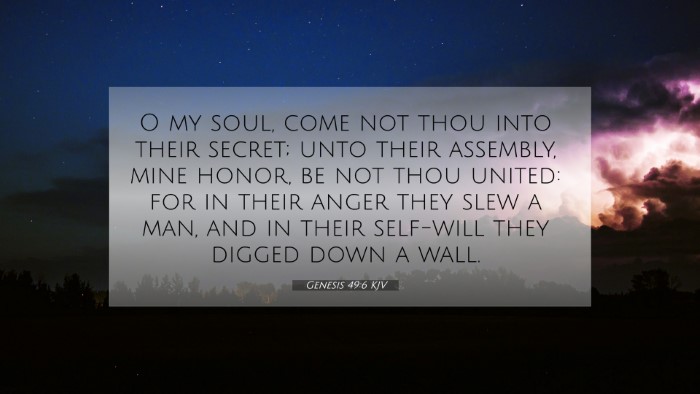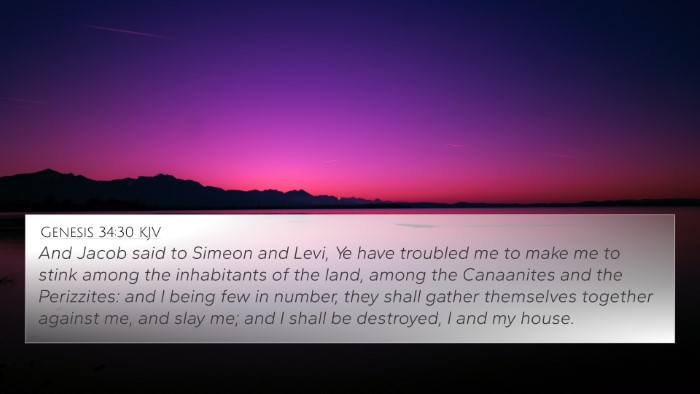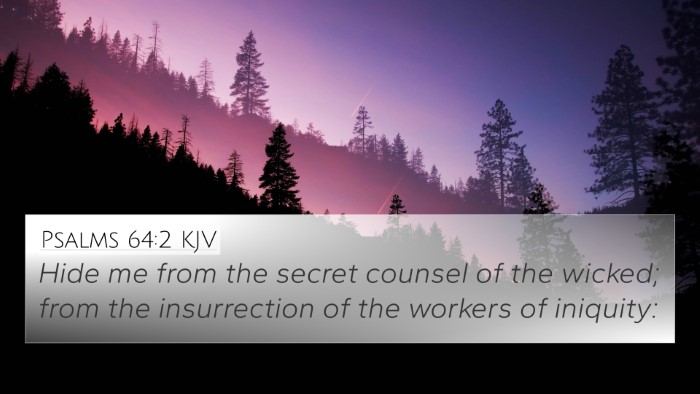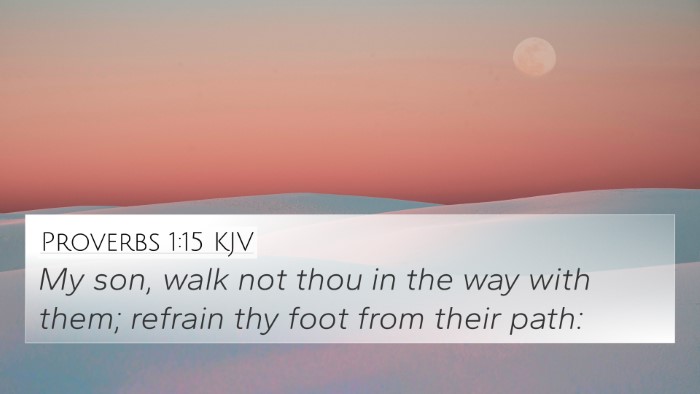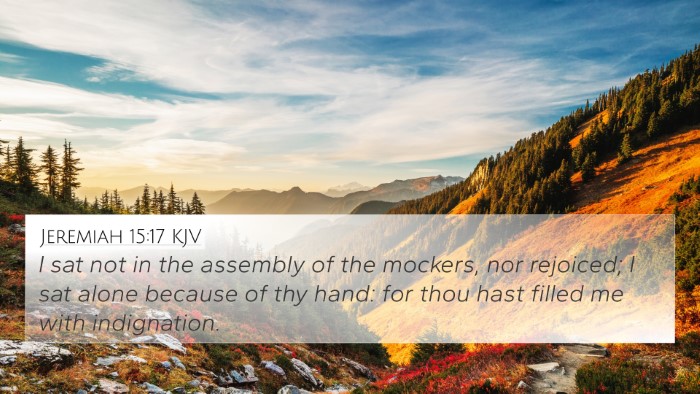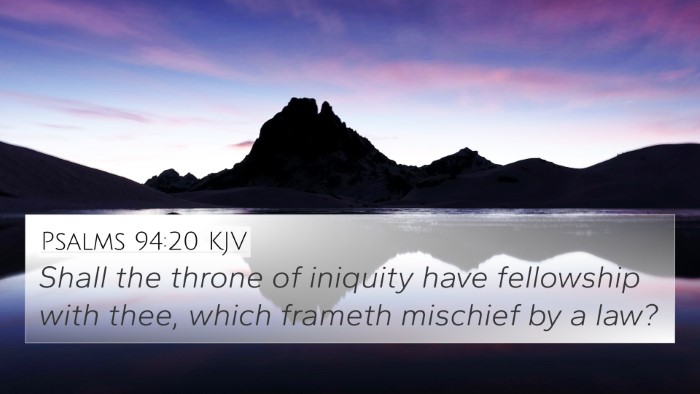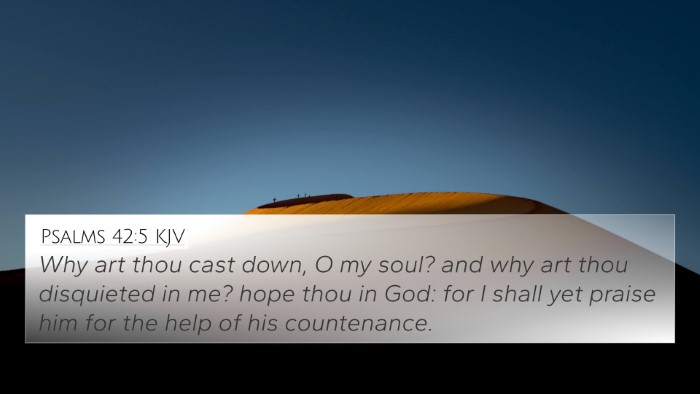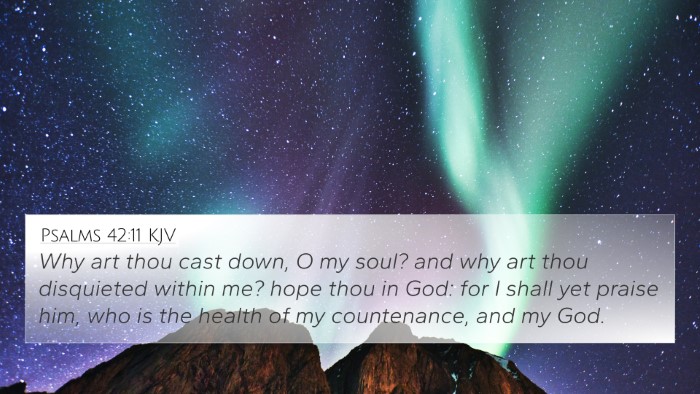Understanding Genesis 49:6
Genesis 49:6 states: "O my soul, come not thou into their secret; unto their assembly, mine honor, be not thou united: for in their anger they slew a man, and in their self-will they digged down a wall."
This verse is part of Jacob's final blessings and prophecies concerning his sons. It reflects deep familial and historical dynamics, particularly concerning the tribes of Simeon and Levi.
Summary of Insights from Public Domain Commentaries
- Matthew Henry's Commentary:
Matthew Henry emphasizes the harmful consequences of Simeon and Levi's actions, highlighting their violence and treachery. He notes how their anger led to a great sin, suggesting that Jacob's admonition reflects both a warning and a call for avoidance of violent alliances.
- Albert Barnes' Notes:
Barnes provides a detailed analysis of the phrase "come not thou into their secret," indicating that Jacob is concerned about the collective character of Simeon and Levi. He interprets the assembly as a reference to their unjust inclinations, urging caution against joining them in their ways.
- Adam Clarke's Commentary:
Clarke provides insight into the moral implications of the actions of Simeon and Levi. He acknowledges that their fierce rage and violent actions sowed discord, and therefore, Jacob's words serve as a significant warning for future generations against such behavior.
Thematic Connections and Verse Cross-References
Genesis 49:6 can be connected to various other Bible verses that reinforce its themes of violence, moral integrity, and family dynamics. Here are some notable cross-references:
- Exodus 32:27-28: The execution of those who participated in rebellion echoes the severe consequences of anger and violence.
- Proverbs 1:10-15: A warning against being tempted to follow the violent path of sinners aligns with Jacob's concerns for his sons.
- Micah 3:3: This verse illustrates similar themes of betrayal and violence in the context of leaders taking advantage of the innocent.
- Hebrews 12:15: It speaks to the dangers of bitterness and how it can lead to defilement, echoing Jacob's warnings about destructive anger.
- James 1:20: This verse connects to the idea of righteous anger, contrasting it with the type of anger demonstrated by Simeon and Levi.
- Genesis 34:25-26: The recounting of actions taken against Shechem directly ties into Jacob's lament over his sons in Genesis 49.
- Matthew 5:21-22: Jesus' teaching on anger recontextualizes the Old Testament understanding of homicide, resonating with the moral lessons Jacob imparts.
Connections Between Bible Verses
Exploring the connections between Genesis 49:6 and the aforementioned verses provides valuable insights into how anger and violence disrupt familial and social bonds. These scriptures can be used as effective tools for Bible cross-referencing, enabling deeper understanding.
Cross-Referencing Biblical Texts
When engaging in a cross-reference Bible study, one may utilize a Bible concordance or a Bible cross-reference guide to identify themes and teachings throughout both the Old and New Testaments. Understanding these narratives helps in recognizing the thematic connections between different Bible verses.
Comparative Bible Verse Analysis
The comparative study of texts like Genesis 49:6 with references from the teachings of Jesus, as seen in the Gospels, or the Pauline epistles illuminates an ongoing inter-Biblical dialogue that reflects on human behavior and divine moral standards.
Conclusion
The verse Genesis 49:6 serves as a profound reminder of the consequences of violence and betrayal within families. By cross-referencing this verse with others, believers can gain a more nuanced understanding of the biblical perspectives on anger, retribution, and morality.
Employing tools for Bible cross-referencing opens avenues for deeper exploration of the Scriptures, helping individuals to find cross-references for specific Bible verses and to discover how different passages resonate with one another.


